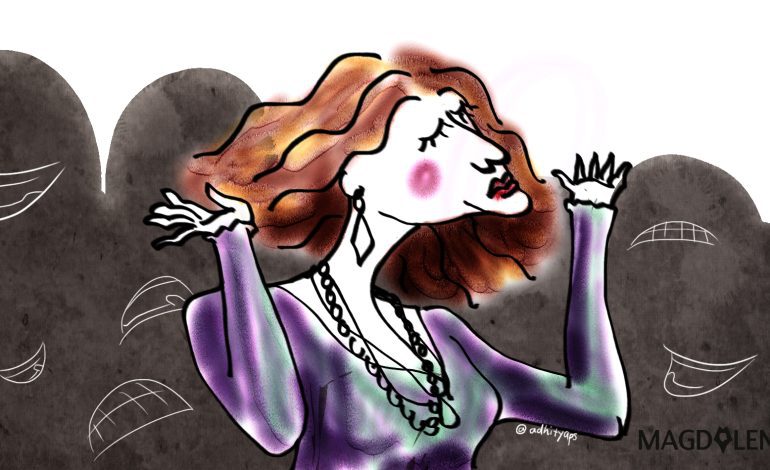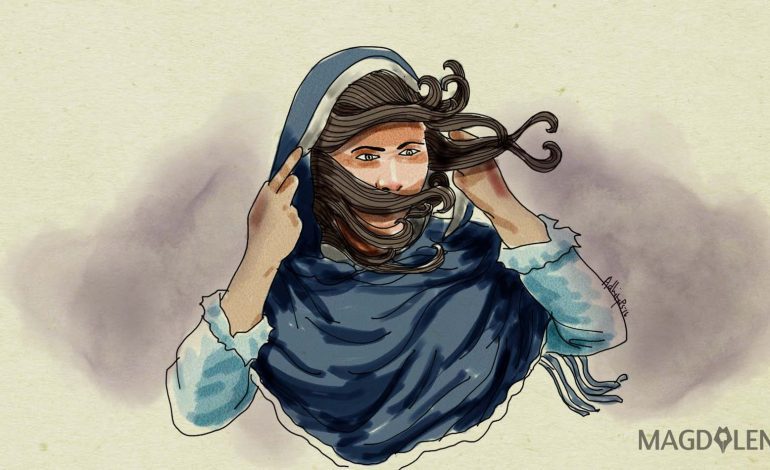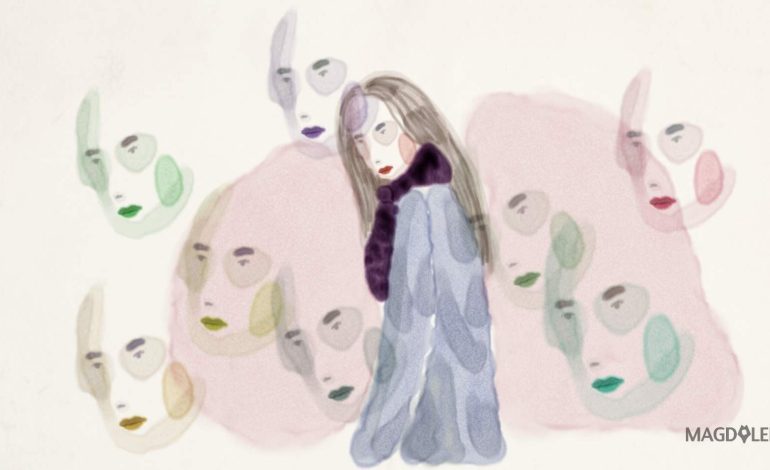At Rumah Singgah Transpuan Transwomen Bound by Love and Self-reform

For Mami Yulie, taking care of 100 cattle is a much easier job than handling one transwoman.
Most of transwomen in Indonesia, Mami Yulie said, are unruly, uneducated and will definitely put mannerism and decency behind efforts to look pretty. They don revealing clothes and heavy makeup to the streets, turning the heads of those who are yet ready to welcome this expression of identity. They incline to flock together, often attracting unwanted attention.
And then there is the struggle to keep up with their mood swings, mostly stemming from over-consumption of hormones.
“I told them again and again that hormones should only be drunk once a week, but they still think that the more the better. Some are so adamant they even drink seven times a day,” she lamented. A lot died young from this over-consumption, she added.
“But if not me who takes them in, who else?” Mami Yulie told journalists as she perched on a brown leather sofa in the living room of her transwoman shelter located deep in a densely populated area on the outskirts of Depok, West Java.
On a recent Saturday, members of Mamie Yulie’s shelter celebrated Valentine’s Day with China-based gay social media Blued, businesswomen and former child star Dena Rachman and designer Yosafat Dwi Kurniawan in a humble sharing event. As everyone was encouraging each other to be kind, to be herself and to love each other, Mami Yulie talked about her shelter and her goal for the community members.
Dubbed Rumah Singgah Transpuan, the shelter currently manages about 800 transwomen who come in batches to practice health massages and make brooches.
Mami Yulie, the former chairwoman of Indonesia’s Transwomen Association, first established the shelter in 2011 to accommodate elderly transwomen with no family and who could no longer work to support themselves.
But as time went by, she decided that she could not just ignore those in productive age. So she gradually shifted the house into a communal space where transwomen gather and practice skills so they can have better livelihood.
There are reasons behind this, and among them are concerning condition of transwomen in Indonesia. While there are no official statistics, activists estimate that there are around seven million transwomen in the country, most of them living in poverty.
“Compared to other spectrums in the LGBT, transwomen are generally behind in terms of education and financial capability,” Mami Yulie said. Currently she estimated that only around 400 transwomen holds a bachelor’s degree.
While it is arguably easier for gays, lesbians, bisexuals and even transmen to go undercover and blend in with society, the case is different with transwomen. Because of the high visibility of their gender expression, many are disowned by their family and dropping out of school, ending up living as pariahs on the streets. With no skills and education, most of them resort to informal jobs, from hairdressing, busking to sex work to earn a living.
Unsurprisingly, a quarter of HIV/AIDS patients in Indonesia are transwomen.
Mami Yulie herself has had her share of struggle. She spent dozens of years living as a sex worker before it struck her somehow that she needed to change, for herself and her community.
Her failed attempt on grabbing a seat in the country’s human rights commission back in 2012 led her to a bitter realization: when you are a minority, you need money to help pave the road to a position of power, from where you can help. To be financially capable, you need skills and education.
In 2010 she got her bachelor’s degree when she just hit 39. Now, she is finishing her dissertation in Law Faculty at Jayabaya University. This is the spirit she hopes to spread to her community.
Through the shelter, and with donations from Catholic churches to help finance the operation, she hopes to help other transwomen like her reform and alleviate their economic condition.
There are noble dreams, like seeing transwomen living side by side in harmony in society. “But what is important for now is how to fulfill our rights as a citizen. By that I mean the rights to have a better job and to pursue formal education.”
Intan, 34, is one of the examples. She was among the first to join the shelter, and has now become Mami Yulie’s right hand and is now dubbed as the house’s “young leader”.
Donning a beautiful blue brocade long dress, Intan, 34, addressed the Saturday forum by repeatedly thanking Mami Yulie for her love and compassion for taking her in to the community.
Intan decided to leave her house in Tegal, Central Java, two decades ago because she wanted to live free from her family’s pressures. She had been living on the street as a worker since then, and a chance meeting with Mami Yulie during a transwoman event in Depok gave her a new chance at life. She now handles the day-to-day operation of the shelter.
She said that while she was only “70 percent reformed” – referring to the fact that she still does sex work at night – she had now aimed to learn all the best experiences she could from Mami Yulie.
“My family is now at peace with who I am. Now all I want in life is to always be there for my family and my community,” she said.
Mami Yulie’s shelter has taken people from various backgrounds, including an immigrant for Taiwan that was ousted by her family and a few transwomen fleeing persecution in Aceh, where the strict sharia law has emboldened discrimination and violence against the LGBT community in the province.
Be Modest, Spread Love
For the transwomen to join the community, there are some unwritten rules that they must follow, however.
“If they want to be a member of this shelter, they should be willing to listen. Cut your hair short. Don’t wear excessive make up. Wear modest clothing. It’s no time for us to look sexy. If you want to look pretty, grab a wig and let us gather together in a room where we can wear whatever we want and gossip about to our heart content,” she said.
Sad as it may seem, but Mami Yulie thinks these moves are essential for them to survive society’s harsh judgements: “In order for you to be accepted by society, you first have to respect and adjust to their values.”
The majority of some 30 transwomen who gathered during the event wore men’s clothing and had their hair cut above shoulders.
“Be modest and spread love and kindness” has always been her recipe to blend in.
Perhaps this is why despite actively operating in Depok – one of the most intolerant cities in Indonesia according to a 2017 report by Setara Institute – Rumah Singgah Transpuan has never once encountered conflict with local residences.
Finding the blue-painted house felt like a breeze.
“Mami Yulie’s house? That’s where all the beauties come and gather, isn’t it? The house is just right on the corner of that small back alley,” a hijab-wearing kiosk seller nearby explained to some passing journalists.
When asked whether the neighbors are ever uncomfortable with the presence of the house among them, the kiosk seller – whom the transwomen refer to with Javanese moniker “Budhe” – firmly said, “No. Not even once.”
“Mami is a very compassionate person and is active to join local celebrations like tujuhbelasan [Independence Day], she mobilizes her members to design our costumes when there are such celebrations and they are good at it. They don’t do anything weird so why should we bother?” Budhe, who has been living in the area for slightly over a decade, explained. She added that the locals respected Mami Yulie so much that they would definitely shield the members if anything bad happened to them.
Dena Rahman said that everyone faced their own problems, but being a transwoman requires extra efforts and patience. It is impossible to force society to accept them just like that, sometimes they even have to compromise their identity.
How Mami Yulie had shown how love and compassion were keys to reach people’s hearts, she said, and the fact that members of the shelter could live side by side harmoniously with their neighbors was a concrete proof of that.
“Be kind to your surroundings, everything will work out eventually,” she said.
Mami Yulie holds a firm belief that everyone can accept others despite differences, as long as both parties respect each other’s beliefs and values. She also emphasized how laying low become more imminent during this crucial time.
Nearing election, contending parties could easily use anything against them just to gather votes. She won’t blame both the incumbent or the opposition, she said. For her, it is only normal for them to pick up anything that garners public interest and act upon it.
LGBT movement has become more massive than ever online, she said, and majority mostly act negatively toward it. Transgender, again, becomes the most targeted group given their visible expression.
A recent study by Lembaga Bantuan Hukum Masyarakat shows that about 74 percent of victims of sexual orientation and gender expression-based discrimination and violence in 2017 come from the transgender community. The acts include persecution, assaults and even worse, murders.
While the shelter is considered a safe haven, these series of attacks still instill fears at the shelter.
“We used to have a sign in front of this house. After much consideration, we recently took it down,” she said.
“I guess it’s for the best.”






















